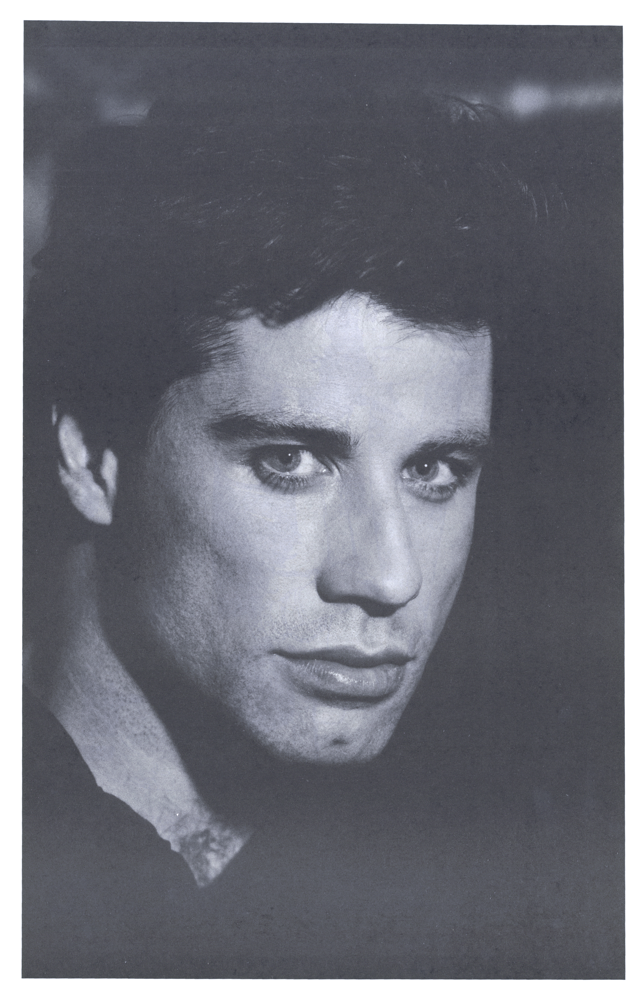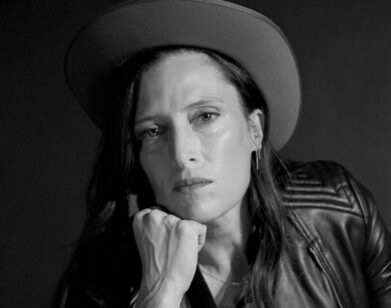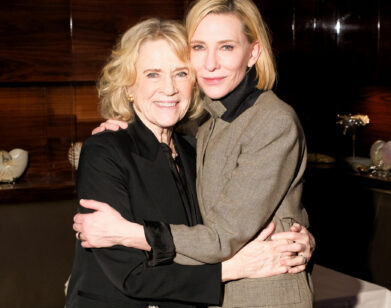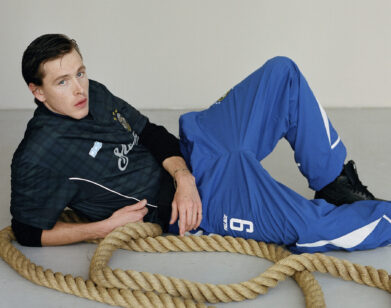New Again: John Travolta
We doubt that John Travolta will be singing the words, “Summer lovin’, had me a blast” any time soon. From our experience, actors get a little upset when you ask them to repeat catch phrases from their previous films. It is also a particularly polemic time to accost Travolta with regards to his summer loving as he is currently facing allegations of sexual battery from a New York (male) masseuse. While the original plaintiff has dropped his charges against Travolta, another masseuse has since come forward.
Here, we revisit Travolta at a happier time, namely June 1985 when Travolta covered Interview. Things we learned or were reminded of while revisiting this interview include the following: speculation regarding Travolta’s sexual preferences are nothing new; at one point both Travolta and Sylvester Stallone were considered sex symbols; Travolta is not a Method actor; there exists a sequel to Saturday Night Fever directed by Sylvester Stallone.
Sylvester Stallone
by Margy Rochlin
Ever since John Travolta landed the part of Vinnie Barbarino on the television series Welcome Back Kotter in 1975, he has, like all true stars, been considered newsworthy. Through the years the press has carefully logged his every mannerism, physical nuance, and life occurrence. We had duly noted his winning boyishness, the blinding power of his smile, and the pale translucence of his blue eyes. We have gauged his self-confidence as it waxed and waned, applauding his virile brilliance in Saturday Night Fever, and pointing an accusing finger for the abysmally bad Moment by Moment. We commiserated when he lost both his mother, and girlfriend Diana Hyland, to cancer within a brief period. We mocked his jittery display of caution during the filming of Urban Cowboy. And somewhere along the way, as John Travolta’s life became part of our collective consciousness, we mistook his sweet vulnerability for helplessness. Few dignified the fact that he was no longer the shaggy Barbarino, that he had grown up, become a man.
John Travolta was born on February 18, 1954, in Englewood, New Jersey, the youngest of Helen and Salvatore Travolta’s six children. After leaving high school at 16 to pursue an acting career, he landed his first film role in The Devil’s Rain (1975), a cheapie horror movie featuring a makeup-laden John shouting two lines (“Blasphemer! Get him, he is a blasphemer!”).
By the second season of Welcome Back Kotter, his work won him other roles, including a critically acclaimed performance in The Boy in the Plastic Bubble (1976) and a supporting role in Brian de Palma’s Carrie (1976). These two projects would lead to a three-picture deal with producer Robert Stigwood which would yield Saturday Night Fever (1977), Grease (1978), and Moment by Moment (1978). After the devastating effect of the last’s failure, he would regain ground with Urban Cowboy (1980). But perhaps it was his work as Jack Terrie, a B movie maker in Blow Out (1981) that gave film audiences their biggest jolt. As uneven a film as Blow Out was, Travolta inhabited his role with an eerie credibility, drawing upon none of the macho swagger that had served him so well in the past. He would follow up the part with the Saturday Night Fever sequel, Stayin’ Alive, and the vacuous Two of a Kind.
We met at his 17-acre Santa Barbara ranch, “Ranch Tajiguas.” Several times during the poolside conversation, Travolta interrupted to question me. Initially it seemed that when only the tables were turned did he brighten. “Ask me questions that interest you,” he urged several times.
MARGY ROCHLIN: In preparation for your role in Perfect, you must have gotten a lot of opportunity to analyze interview technique. What do you think of Nancy Collins’ approach [for Rolling Stone, August 18, 1983]?
JOHN TRAVOLTA: When Nancy Collins walked into my home, one of the first things I said to her was, “What’s your hook on this?” She said, “Sex. It’s about sex.” I said, “All right, I’ll try to give you what you need for the interview. I’ll do my best and try to help you.” After nine or 10 years of being interviewed, you start wanting to team up with the reporter and get the job done.
ROCHLIN: According to an article I read, the response to the piece was overwhelmingly negative. The reaction seemed split into two camps: 1) John Travolta has a swelled head, and 2) Nancy Collins took advantage of your willingness to please.
TRAVOLTA: In all defense of her and myself, I probably let her do that. I’m not one of those who claim myself an innocent bystander. I answered her questions and allowed myself to be exposed. It’s the interviewee’s job to know that his privacy is going to be invaded on some level. Otherwise, you are better off not doing the interview.
ROCHLIN: So you didn’t mind being asked if you were gay?
TRAVOLTA: Oh, that. That’s been asked of me before. If the answer is “no,” then what is the big beef?
ROCHLIN: Why do you think people are so fascinated by your sex life?
TRAVOLTA: It has always been part of human nature to question that about people. It didn’t strike me as a shocking question. It’s been asked of other actors, stars, rock musicians, writers.
ROCHLIN: Does it bother you to constantly defend your sexual preference?
TRAVOLTA: No, people are just curious about those kinds of things—especially about famous people. My frank response to all sex questions is that there is too much significance put on them to begin with. Sex is part of human nature, and I don’t know why such a big deal is made out of it.
ROCHLIN: Do you regret doing the interview?
TRAVOLTA: No… My dad thought it was the best interview I’ve ever done. He thought it was brutally honest, vivid.
ROCHLIN: What do you think has been missing from other profiles done of you?
TRAVOLTA: I’ve done so many interviews that I’ve gotten past the ego and the personality. I used to feel that there might be something missing, but a few years ago I realized that I was so causative over how the interview went that I was no longer concerned over the effects of the interview.
ROCHLIN: In Perfect there is a scene where Carly Simon throws a Bloody Mary in your character’s face because she is angry about something he wrote about her. Has anything that has been written about yourself inspired that kind of ire?
TRAVOLTA: I remember early on I was really pissed off at an article. The journalist apologized because he knew he had taken advantage of this young upstart from a television series. I mean, he’s a clever writer, fairly impressive, but he did all the classic turns. I felt it was one time when a person seduced me into insulting the situation. I thought we were communicating, but all the vulnerable parts of the interview were turned around on me.
ROCHLIN: For Perfect you wrote several articles—about Jamie Lee Curtis, Debra Winger, director Jim Bridges… If you were going to do an autobiographical profile, how would you describe yourself?
TRAVOLTA: I did write one about myself. One of the comments I made was about my empathy for people and it sometimes being so strong that I become them—even if I don’t know them very well. And it’s painful, especially if they are going through something that is not particularly pleasant. That was one of the aspects I wrote about.
ROCHLIN: Your mother was always something of a support system for you. How did you readjust after her death? Who did you turn to?
TRAVOLTA: I guess I grew up. When my mother died it sort of put a damper on things. My career didn’t have the same significance or excitement. It had always been about doing well for my family—my brothers, sisters, father, mother. Then something interesting and important happened—I started doing things for me. And you know what? It’s easier to be responsible for the decisions that you’ve made yourself than for the ones that other people have made for you.
ROCHLIN: You’ve commented before that the working class identifies with you because you are working class. Doesn’t your enormous income, this ranch, your lifestyle, make you feel removed from all that?
TRAVOLTA: I’m definitely working class and I still believe in those values. I know that losing everything would not be an unfamiliar feeling. Meaning, if you don’t have it anymore, you didn’t have it to begin with. If you have a nice car and you have to get rid of it, that doesn’t feel good. But if you came from a big family where you’ve adjusted to having and not having… That’s the whole point of Greenwich, the film I’m going to direct. It’s about people who were born with money and have to adjust to complete poverty afterwards and how unpleasant it is for them.
ROCHLIN: Do you believe that your working class characteristics are part of your appeal?
TRAVOLTA: I don’t think about it. I’m too busy looking for the next role to do. I think about how to continue, to survive in the same vein. I like my career and my life as it is.
ROCHLIN: While you were still doing Welcome Back, Kotter, you were offered the starring role in Terrence Malick’s Days of Heaven but could not get out of your contract. How do you think it would have altered your career if you had done the part?
TRAVOLTA: I think if I had done Days of Heaven, I would not have done Saturday Night Fever, and it is possible I would not have the career I have today. I loved the opportunity to do that kind of art in film, but I think Saturday Night Fever was a better catapult to a career.
ROCHLIN: It has been said of you—financial returns notwithstanding—that you are an important actor with a tendency to choose less important projects.
TRAVOLTA: I think Saturday Night Fever, Urban Cowboy, Blow Out, and Perfect are about as Class A as you can get in pictures. I mean that from the point of view of the script and how the product turned out. But I was thrilled to do Grease. It was a gift to the public, it was a gift to me when I saw it on stage. Sometimes you don’t always do films for the same reason… I mean, I did Two of a Kind for fun.
ROCHLIN: At the end of Saturday Night Fever, one was lead to believe that Tony Manero had made a leap in respect to how he viewed women. But by the end of Stayin’ Alive, we found him tossing a woman out of the spotlight so that he could do his big solo dance. Do you feel that Tony’s lack of personal growth compromised the character?
TRAVOLTA: There’s no rule that everyone has to change. I loved Stayin’ Alive. Also, the promise of change doesn’t always mean something changes. I mean, the guy at the end of Saturday Night Fever was so distraught—his friend had committed suicide, this girl was sexually frustrating him. He didn’t know where to turn. He turned to someone who he thought might be a friend. Who knows what happened to that relationship? Maybe she didn’t turn out to be the kind of woman who could help him learn to be a friend to women and not treat them as sex objects. There’s all sorts of variables. It’s just that we chose to write the more entertaining choice versus the more artistic one.
ROCHLIN: Would you do another sequel? Saturday Night Fever III?
TRAVOLTA: Maybe. It depends on how interesting it could be. I think sequels are done for entertainment, not for psychological impact. I mean, what would you do with a sequel to Ordinary People? [laughs] But I guess if I were to do a sequel, Tony could be a choreographer. Maybe he could go to Hollywood and do movies.
ROCHLIN: For some time you planned to do a film adaptation of the Jim Morrison story with Brian De Palma, called Fire. What attracted you to Morrison as a character?
TRAVOLTA: It was a combination of his being such an interesting individual, the outstanding music, and the fact that he chose music in which to be a contemporary poet. His eccentricities, his getting lost in drink and drugs as an answer, his insomnia…
ROCHLIN: Can you draw any parallels between Morrison and yourself?
TRAVOLTA: Insomnia. [laughs]
* * *
ROCHLIN: You have tremendous star presence. Can you control it? Do you have the ability to shut it on and off?
TRAVOLTA: The real truth of that has to do with the degree that you are there. In other words, if you have a day when you are feeling really on top of things, you have a lot of presence. But let’s say you are preoccupied, the degree of your preoccupation affects the degree that you are not there.
ROCHLIN: You have the quality of being able to exude sexuality on screen. What women do you think you have good chemistry with in films?
TRAVOLTA: I guess the obvious is Olivia (Newton-John). Jamie (Lee Curtis) and I had a lot of chemistry together. I think someone like Goldie Hawn and I might have chemistry together. I thought Debra Winger and I had great chemistry.
ROCHLIN: One of your most famous quotes had to do with your status as a star. You said that Richard Gere, Sylvester Stallone, and yourself were the only three male box office sex symbols.
TRAVOLTA: Oh boy, did I get in trouble for that one… It was actually quoted to me by a studio head. I thought when I said it I had explained it in context. Like, “It appears to be…” or “According to…” and the way it was edited… I mean, who knows? Every year there is a whole new crop of people.
ROCHLIN: Sex symbols are often thought of as less than intelligent. Was it not a concern of yours that the body-building you did for Stayin’ Alive would only lend itself to the stereotype of the vacant beefcake?
TRAVOLTA: I’ve never had that concern of thinking of myself as stupid. And honestly, I was not in very good shape when I got healthy. I was so happy and excited to (get in better shape) that I really didn’t care about the consequences. I had a big, thick roll of fat around my waist. I was bloated. My hair was dry and flaky. My skin was bad. I was feeling so badly. So I thought to myself. “I’m going to be like Muhammad Ali and pull it together for my 28-year-old fight! I’m going to get this act together!”
ROCHLIN: In the past, you’ve been offered the Elvis Presley story. If you were to play that role, would you do like Robert De Niro did in Raging Bull and bulk up for the part?
TRAVOLTA: No. I’ve gotten out of shape in a minor way for films like Blow Out. For Perfect, I’m a journalist, so I didn’t work out or anything. I would investigate it if I thought it could be done in a healthy way. See, there’re two movies in a person’s life: the movies done on screen and people’s own movies. If it took ten years off my life, I don’t think I’d want to do it.
ROCHLIN: How far would you go to prepare for a role?
TRAVOLTA: I’d learn any skill or craft.
ROCHLIN: Would you have a couple of teeth pulled?
TRAVOLTA: No way. I think there’s a fine line in acting. How far do I go to act and how far do I have to change the things I was born with? When does it become affectation? When does it stop being acting and become plastic surgery? I enjoy research. I loved being a journalist for Rolling Stone. I loved learning to ride a mechanical bull for Urban Cowboy. I loved becoming a ballet dancer for Stayin’ Alive. But there’s that fine line. I’m willing to look my own nightmare on film, but if it endangers my life, then I’m willing to put my life before movies.
***
ROCHLIN: In 1983, you said that although you were still a Scientologist, you had not been involved with the organization for some time.
TRAVOLTA: I’m involved again.
ROCHLIN: What happened?
TRAVOLTA: There was a period of time when (L. Ron) Hubbard left the lines, and there was this infiltration of certain personalities that disrupted the organization. I decided that I was going to use the technology—I have all the books—and when they cleaned up their act I’d come back. Hubbard has been back for about a year and it’s been great again.
ROCHLIN: I thought that no one is sure of his whereabouts. How did you know he was reinvolved?
TRAVOLTA: I got a letter telling me.
ROCHLIN: Which of these things do you dislike most in a person: opportunism, selfishness, or deceptiveness?
TRAVOLTA: I guess deception, because you never know what a person is up to. It’s a break in trust.
ROCHLIN: Do you ever feel that you have to be deceptive in order to maintain your personal privacy?
TRAVOLTA: No, but I think I’ve observed others trying to be deceptive.
ROCHLIN: About you?
TRAVOLTA: No. Well, yeah. About me.
ROCHLIN: Given the way you feel about deception, does it bother you that there are men who claim they’ve had sex with you?
TRAVOLTA: [laughs] Oh, God. Really? [leans forward, laughing] Who says that? Actually, there is one girl who is fairly famous who said, “Oh yeah, I’ve had sex with John.” I’ve never had anything with her. [laughs] It’s par for the course. But I guess if yout told me a name I could probably call them up and say, “Did you say that?” and then I would probably call you up too. Or maybe I would get both of you on the phone.
ROCHLIN: Finish this sentence: “The most erotic situation I could imagine is…”
TRAVOLTA: When I’m horny. When I’m horny is when I’m the most erotic. I like talking about sex. Especially when I’m horny, but even when I’m not. [laughs]
THIS INTERVIEW HAS BEEN ABRIDGED. THE FULL VERSION ORIGINALLY APPEARED IN INTERVIEW‘S JUNE 1986 ISSUE.







